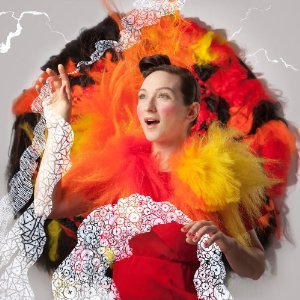Initially wandering onto the radar in 2005 with her contributions to Sufjan Stevens’ Illinois and subsequent tour support slots, Shara Worden has presented an idiosyncratic musical character in her solo work. A marriage of the naïve and the sinister has always permeated her music – Take ‘Disappear’ from her debut full-length; fairytale tinkling above a bleak, intimidating drum track, while an innocent child’s croon carries pitch black lyrics. Now, on her third album proper, All Things Will Unwind, this dramatic range is pushed even further. The acoustic guitar strums that open the first track are already a sidestep, as if Worden plans to kick twee to the curb, but within the space of less than a song, the gratuitously upbeat backing vocals arrive. It’s the contrast of this with the darker blues-derived moods that let them get away with the saccharine repetition of “love binds the world”.
My Brightest Diamond has always excelled in the quality of her arrangements, and there’s no exception in these pieces, written for New York sextet yMusic (who have also worked recently with Son Lux and St. Vincent, and toured as players for far too many artists to list here). Specific high points include ‘In The Beginning’, where flutes trill above minimalist guitar patterns, violins articulate trad-folk fragments, and Worden’s immaculate falsetto floats on a meandering, pastrol current of melody. Her use of eccentric, often cacophonous, percussion also returns on the clockwork sounding ‘Ding Dang’ and album highlight ‘Everything is in Line’.
A stylistic strand that has been developed and emphasised this time around is the use of full orchestra – grand, theatrical, almost camp. The songs are laced with huge instrumentation akin to that on Joanna Newsom’s Ys – the strings somersault in dramatic, elvish flute flourishes augment the music’s already heady mysticism. This otherworldly sensibility has always been a prevalent feature in Worden’s music, and is best seen in ‘She Does Not Brave The War’, which opens with 1920s-ward piano samples and goes on to sparsely ache through an intense jazz ballad, referential but still dominated by Worden’s personal histrionics.
No foreign territory is traversed here, but it intelligently refines and elaborates on the existing My Brightest Diamond palette. Under the rule of Worden’s powerful vocal these sophisticated compositions provide a gripping, melodramatic exploration of a mindset both childlike and brooding.


